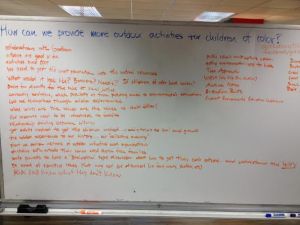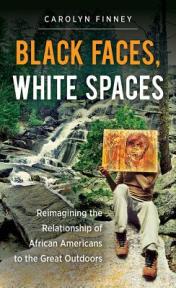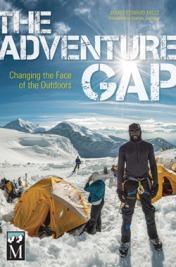Some Black people think that outdoor activities are strictly the domain of White people.
This was a key finding from a brainstorm session at 100State where we addressed the question, “How can we get more children of color outdoors?”
Participants identified barriers and solutions to getting more children of color outdoors.
Thank you to the following organizations for your participation. Fitchburg City Council, Dane County Parks, Aldo Leopold Nature Center, Nehemiah Center for Urban Leadership, Madison Notes, WHOA, Black Women’s Wellness Foundation, the Wisconsin Department of Public Instruction and others.
Barriers
-
Lack of connections to the outdoors.
Some Black youth (and adults) dismiss outdoor activities saying, “That’s just for white people.” While no one is suggesting that everyone must like the outdoors, it is important for youth to have choices. Participants want youth to be open to outdoor activities before making decisions about their value.
-
Many Black youth and parents fear the woods.
One participant said, “Many African-Americans will be initially hesitant to venture out into unfamiliar or remote places unless assured that it’s safe for them and their children and that the people in surrounding areas/towns are friendly. Part of our historical memory deals with extreme violence and danger in the wilderness (lynchings/torture/fleeing slavery and violence at great danger).”
-
Transportation can also be a barrier.
Local parks are great, but getting further away from the city can be a challenge for families.
Solutions
-
Reconnect to Nature:
One person said, “Nature and the outdoors is deeply embedded in the DNA of people descended from Africa. Historically, we are no strangers to the outdoors. Prior to mass migration to urban areas in the 1920’s-60’s for work and to escape the racial violence and lack of opportunity in the south, African-Americans largely lived in rural areas, were farmers and agriculturalists and had strong ties to the land, nature, and wilderness. This is part of our collective memory. We just have to re-spark it. Further, before the transatlantic slave trade that brought millions of Africans to the Americas…we as African people had mastered the toughest of wildernesses on our Mother continent. So again – it’s in our DNA – we’re just a few generations removed from the experience.”
- Be Culturally Relevant: What this means is providing activities that celebrate the Blackness of the outdoors. Making youth and adults aware of the many Black outdoor and environmental leaders is a good place to start. Stories about the Buffalo Soldiers, Shelton Johnson, James Edward Mills, John Francis, Matthew Henson, Rue Mapp, Carolyn Finney, Will Allen and others must be told to Black youth and to all people. Black history is everyone’s history. These stories will inspire youth to try outdoor activities and to picture themselves doing things that they once thought were ‘just for white people.’
- Work with families: One participant shared that, “Too often organizations only work with kids. When, if you work with the parents, the children will follow.”
- Provide transportation: The participants of the brainstorm thought that providing a bus would help people take part in events. Transportation always helps, especially if parents are on a tight budget. They coined the term “Nature bus” and envisioned a bus that would travel around town to pick up kids and families for outdoor adventures.
Thank you again those that participated in the brainstorm session. I will be incorporating these ideas into my business plan. The business will be called Outdoors123 and be dedicated to getting children and families of color outdoors.
Hiking while black: The untold story
Why is the American story of nature and conservation so white? Carolyn Finney uncovers a complicated history.
This land is ours: African Americans should claim their place in the great outdoors



